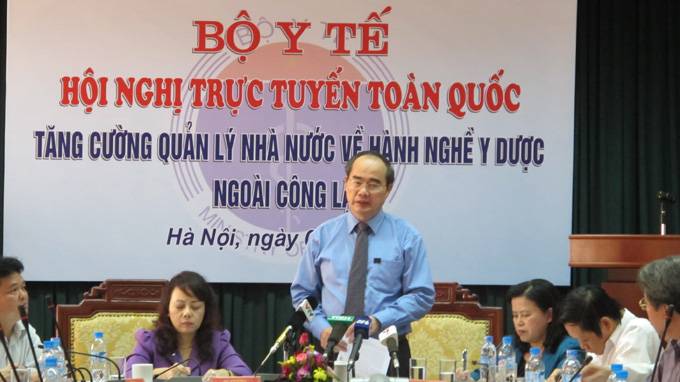In order to improve the efficiency of private health facility management, Deputy Prime Minister Nguyen Thien Nhan has named six tasks that must be done as soon as possible.
>> Killer doctor operates illegally; body dumped into river still not found>> Deputy health ministers to lead 5 inspection teams The deputy PM listed these tasks while attending an online conference held by the Health Ministry on Monday on strengthening management in private medicine and pharmacy practice. The country has 290 health inspectors but there are as many as 800 state-owned hospitals and 69,000 private health facilities. “This small number of inspectors may cover the State-owned hospitals but they cannot possibly extend their inspections to private facilities,” the Deputy PM said. Therefore, he said, “it is high time we work out effective measures to improve management of these private facilities, and stop relying on examinations by those inspectors.” Accordingly, the Deputy PM suggested six things that need to be done to improve the state of healthcare in Vietnam. Firstly, the health sectors should review all law documents related to the sectors and work out and submit to the Government a draft decree on administrative penalties for health violations, including the private health sector. Secondly, the Health Minister should issue specific instructions on spa and healthcare services. Thirdly, three ministries: Health; Information and Communication; and Culture, Sports, and Tourism, must coordinate to issue instructions on advertising related to health in the first quarter of 2014. Fourth, the Health Ministry must issue criteria for classifying, assessing, and grading private health facilities in the first quarter of 2014 to facilitate the management and help improve service quality. Fifth, private health facilities must be asked to publicize four issues: operation objectives, workforce, service charges, and the name of the agency that directly manages them. Finally, the decentralization of management over private health facilitates must be reviewed in order to improve management over three procedures: business registration, granting practitioner’s certificates, and granting licenses for medical examination and treatment. Regarding this issue, Chief inspector of the Health Ministry Dang Van Chinh suggested that People’s Committees of communes and wards should be assigned to manage and control private health facilities to detect illegal ones. In related news, the Helath Ministry has set up five teams to conduct comprehensive health inspections, including those at beauty salons in 10 major provinces and cities. Each team is led by a deputy minister, who will focus the team’s activities on detecting and correcting shortcomings and management loopholes, assessing the compliance with applicable laws and regulations, and initiating solutions to problems facing the health sector.
Ho Chi Minh City Health Department has also asked health centers in all 24 districts to tighten their control over private health facilities to discover those that are unlicensed or unqualified. These tightened restrictions are spurred by an incident in which a 37-year-old woman died after receiving cosmetic surgery at Cat Tuong Beauty Salon in Hanoi on October 19. Her body was thrown into the Hong River by Dr Nguyen Manh Tuong, the salon’s owner, who performed the surgery. Tuong has been arrested but the body of the victim has yet to be recovered.






















































